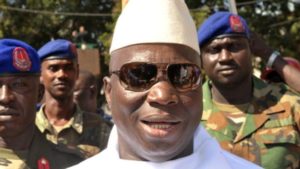
AFP/Yahya Jammeh first seized power in 1994.
Gambia’s national assembly has adopted a resolution to allow President Yahya Jammeh to stay in power for three more months, starting Wednesday, Jan. 18, just hours before the end of his official term.
Jammeh, who has ruled the small West African country for 22 years, initially acknowledged opponent Adama Barrow as the winner of elections in December, but later rejected the ballot count as flawed and lodged a complaint with the country’s Supreme Court.
Barrow, who is currently in Senegal, is scheduled to take office on Thursday. He insists his inauguration will proceed as planned.
The move by the Gambian Parliament comes a day after Jammeh declared a 90-day state of emergency, alleging “unprecedented and extraordinary amount of foreign interference” in the country’s internal affairs.
“The decision to declare a state of emergency was taken by the national parliament, but the only people who are sitting in parliament are the members of Jammeh’s political party,” Al Jazeera’s Nicolas Haque said, reporting from neighboring Senegal’s capital, Dakar.
Jammeh is refusing to step down despite international pressure and a threat by leaders of the Economic Community of West African States of a military intervention to make him hand over to Barrow.
“According to ECOWAS officials, the national assembly’s decision is inconsequential,” Al Jazeera’s Ahmed Idris said, reporting from Nigerian capital, Abuja. “They say it doesn’t matter whether it’s been extended by three months, one year or 10 years. What they are saying is Jammeh must step down after midnight on Wednesday, otherwise ECOWAS and the African Union will intervene to ensure that the mandate given to Barrow by the people of Gambia stands the next day.”
Jammeh’s decision not to step down has created political turmoil in the country. At least five ministers have resigned from his government, hundreds of people have fled to neighboring Senegal and others in the country say they fear violence.
Gambia is one of Africa’s smallest countries and has had just two rulers since gaining its independence in 1965. Jammeh seized power in a coup in 1994 and his government has gained a reputation among ordinary Gambians and human rights activists for torturing and killing opponents.
Speaking to Al Jazeera from Dakar, Sidi Sanneh, Gambia’s former foreign minister, accused Jammeh of corruption and pillaging state coffers.
“I don’t think that the Gambian people are prepared to let him off with anymore loot from the treasury,” Sanneh said.
Read more here


